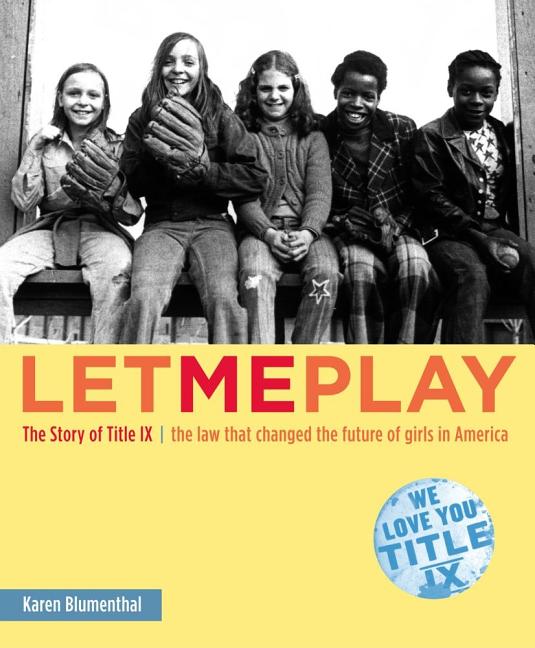Book Descriptions
for Let Me Play by Karen Blumenthal
From Cooperative Children's Book Center (CCBC)
With so many girls and young women today playing competitive sports or pursuing whatever field of study that interests them, it’s no doubt difficult for them to fathom how different their lives would have been had they been growing up in the United States before the law called Title IX. Passed in 1972, Title IX bans educational institutions that receive federal funding from treating boys and girls differently. Karen Blumenthal’s fascinating, well-researched history of Title IX is packed with engaging personal stories of athletes, politicians, and everyday girls and women who grew up before, during, and after the fight to legislate and enforce it. Blumenthal relates how this “modest little law” has become a force to be reckoned with thanks to advocates who have fought for the chance to show how much muscle it really has. In doing so, she shows how Title IX was both the result of and fueled by sweeping social change that continues to be inspiring. (Ages 11–18)
CCBC Choices 2006 . © Cooperative Children's Book Center, Univ. of Wisconsin - Madison, 2006. Used with permission.
From the Publisher
Can girls play softball? Can girls be school crossing guards? Can girls play basketball or ice hockey or soccer? Can girls become lawyers or doctors or engineers?
Of course they can...
today. But just a few decades ago, opportunities for girls were far more limited, not because they weren't capable of playing or didn't want to become doctors or lawyers, but because they weren't allowed to. Then quietly, in 1972, something momentous happened: Congress passed a law called "Title IX," forever changing the lives of American girls.
Hundreds of determined lawmakers, teachers, parents, and athletes carefully plotted to ensure that the law was passed, protected, and enforced. Time and time again, they were pushed back by Þerce opposition. But as a result of their perseverance, millions of American girls can now play sports. Young women make up half of the nation's medical and law students, and star on the best basketball, soccer, and softball teams in the world. This small law made a huge difference.
From the Sibert Honor-winning author of Six Days in October comes this powerful tale of courage and persistence, the stories of the people who believed that girls could do anything -- and were willing to fight to prove it.
A Junior Library Guild Selection
Of course they can...
today. But just a few decades ago, opportunities for girls were far more limited, not because they weren't capable of playing or didn't want to become doctors or lawyers, but because they weren't allowed to. Then quietly, in 1972, something momentous happened: Congress passed a law called "Title IX," forever changing the lives of American girls.
Hundreds of determined lawmakers, teachers, parents, and athletes carefully plotted to ensure that the law was passed, protected, and enforced. Time and time again, they were pushed back by Þerce opposition. But as a result of their perseverance, millions of American girls can now play sports. Young women make up half of the nation's medical and law students, and star on the best basketball, soccer, and softball teams in the world. This small law made a huge difference.
From the Sibert Honor-winning author of Six Days in October comes this powerful tale of courage and persistence, the stories of the people who believed that girls could do anything -- and were willing to fight to prove it.
A Junior Library Guild Selection
Publisher description retrieved from Google Books.


